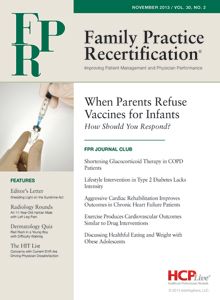Discussing Healthful Eating and Weight with Obese Adolescents
Conversations about healthful eating between parents and students are associated with a lower prevalence of disordered eating behaviors in adolescents, while conversations about weight result in a higher prevalence of those behaviors.
Frank J. Domino, MD
Review
Berge JM, MacLehose R, Loth KA, Eisenberg M, Bucchianeri MM, Neumark-Sztainer D. Parent conversations about healthful eating and weight. JAMA Pediatr. 2013 Aug 1;167(8):746-53. http://archpedi.jamane2rk.com/article.aspx?articleID=1700514.
Study Methods and Patient Demographics
This was a cross-sectional analysis of a socioeconomically and racially/ethnically diverse sample of 6,400 adolescents from 2 linked, multilevel, population-based studies: The Eating and Activity in Teens 2010 (EAT 2010) cohort with a mean age of 14.4 years old, and the Project Families and Eating and Activity in Teens (Project F-EAT) study with a parental mean age of 42.3 years old. Anthropometric measurements and surveys were completed at school by adolescents, while parental surveys were completed at home.
Intervention and Control
The EAT 2010 student survey and the Project F-EAT parent survey were self-report instruments that assessed factors of potential relevance to weight-related issues among adolescents and parents. The 2 surveys were developed based on surveys that were previously tested among teens and parents, but were refined and then further tested and refined in order to examine the test and retest reliability of measures over a 1- to 2-week period.
Results and Outcomes
Approximately 34% of mothers and 38% of fathers of non-overweight adolescents weren’t engaging in any type of eating or weight conversations with their adolescents, compared to 20% of mothers and 23% of fathers of overweight adolescents.
Among parents of non-overweight adolescents, about 28% of mothers and 23% of fathers were having conversations with their children that focused specifically on healthful eating without mention of weight, whereas only 15% of mothers and 14% of fathers with overweight adolescents were having conversations focused solely on that subject. In terms of discussions about weight or the need to lose weight, approximately 33% of mothers and 32% of fathers of non-overweight adolescents talked about those topics with their children, compared to 60% of mothers and 59% of fathers with overweight adolescents.
Relating non-overweight adolescents whose mothers engaged in healthful eating conversations to those whose mothers engaged in weight conversations, there was a significantly lower prevalence of dieting (22.6% versus 35.3%, respectively), unhealthy weight control behaviors (UWCBs) (29.8% versus 38.9%, respectively), and extreme UWCBs (1.6% versus 5.9%, respectively). The prevalence of binge eating was also significantly lower among non-overweight adolescents whose mothers didn’t engage in eating or weight conversations than among adolescents whose mothers engaged in weight conversations (4.3% versus 7.6%, respectively).
Among overweight adolescents whose mothers engaged in healthful eating conversations, there was a significantly lower prevalence of dieting and UWCBs compared to those whose mothers didn’t engage in healthful eating conversations or whose mothers only discussed weight.
Results and Outcomes (cont.)
Turning to fathers, non-overweight adolescents whose fathers engaged in weight conversations had a significantly higher prevalence of dieting, UWCBs, and extreme UWCBs compared to peers whose fathers didn’t engage in eating or weight conversations. However, there was 1 significant association between fathers’ weight conversations and a higher prevalence of dieting among overweight adolescents, compared with fathers who engaged in healthful eating conversations with overweight adolescents.
Overall, the results indicated that having either parent engage in healthful eating conversations was associated with less disordered eating in adolescents, especially for those who were overweight. On the other hand, having 1 parent engage in weight conversations was just as problematic as having both parents engage in weight conversations for non-overweight adolescents.
Additionally, when at least 1 parent discussed healthful eating but avoided weight conversations with their overweight adolescents, there was a lower prevalence of UWCBs compared to overweight adolescents with 2 parents who didn’t engage in conversations about healthful eating or weight, or who engaged in only weight conversations.
For all analyses, there were no statistically significant differences in the prevalence of health behaviors between adolescents whose parents didn’t engage in healthful eating or weight conversations and those whose parents discussed healthful eating. There were also no significant associations between parental healthful eating or weight conversations and adolescent binge-eating behaviors.
Conclusion
Overall, parental conversations about healthful eating were associated with a lower prevalence of disordered eating behaviors in adolescents, while parental conversations about weight were associated with a higher prevalence of those behaviors.
Commentary
In dealing with adolescents, conversations about healthful eating can lower the risk of unhealthy eating behaviors, including dieting and weight control, as well as binge eating. But even 1 parent — especially a father — who focus on weight rather than health could increase that risk.
In adolescence, self image is in transition, and parental separation becomes apparent in many ways. While this study of retrospective discussions may be fraught with weaknesses, this very well done and verified approach should encourage healthcare providers to counsel parents to discuss and practice healthy eating behaviors with their children in a non-judgmental manner. Conflict and derisive comments about weight may result in the undesired outcomes of behaviors that could influence a lifetime.
About the Author
Frank J. Domino, MD, is Professor and Pre-Doctoral Education Director for the Department of Family Medicine and Community Health at the University of Massachusetts Medical School in Worcester, MA. Domino is Editor-in-Chief of the 5-Minute Clinical Consult series (Lippincott Williams & Wilkins). Additionally, he is Co-Author and Editor of the Epocrates LAB database, and author and editor to the MedPearls smartphone app. He presents nationally for the American Academy of Family Medicine and serves as the Family Physician Representative to the Harvard Medical School’s Continuing Education Committee.
